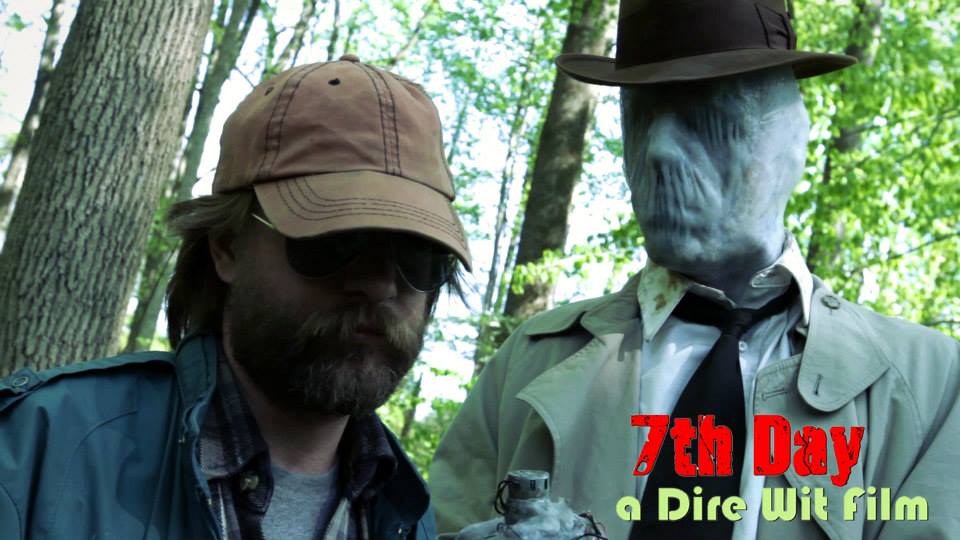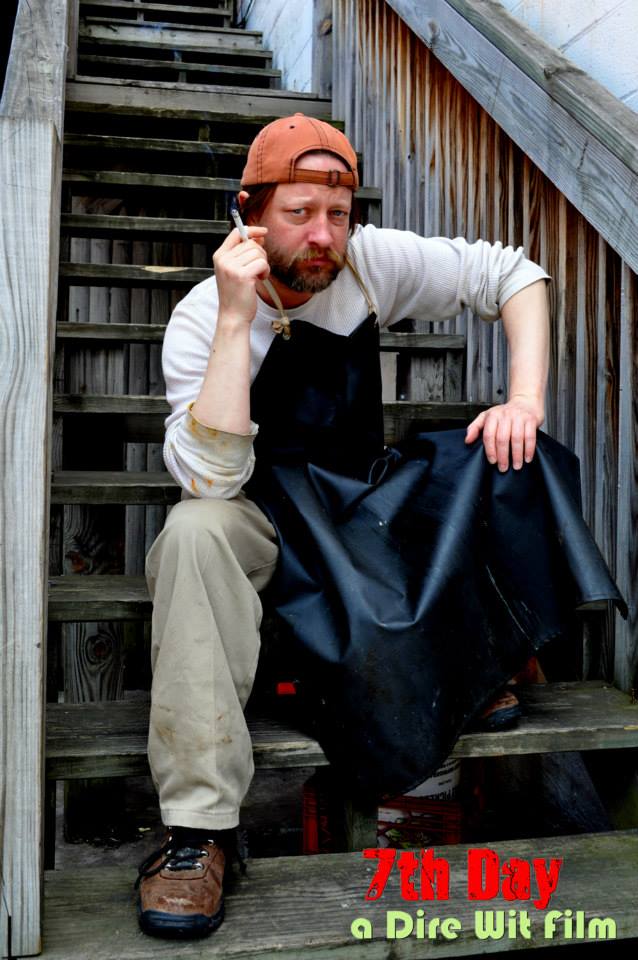7th Day (reviewed by Lisa Marie Bowman)
“It’s my nature” — Alan Dean (Mark S. Sanders) in 7th Day
An attractive young woman, having just gotten off of work, steps into her house. As she nonchalantly walks through her home, a bearded man suddenly appears behind her and, without any sign of thought or hesitation, drives a knife into her neck. As the woman collapses to the floor, we hear a voice:
“Hi. I’m Alan. And this is what I do.”
This is how 7th Day, a serial killer film from Dire Wit Productions, opens. It’s not exactly a surprise that a horror film might open with an innocent victim being murdered by a killer. What is a surprise is how well 7th Day goes on to tell its disturbing story.
This may be heresy to some horror movie fans but I’ve always considered serial killers to be a thousand times scarier than any other monster. Vampires, werewolves, ghosts, demons, and all the rest: they might be scary but to me, the true life menace of the serial killer will always be far more genuinely frightening and nightmare-inducing than anything that those other monsters could hope to inspire. The reason is simple enough. Serial killers are real while those other monsters are fake. I wouldn’t necessarily want to run into a vampire but then again, that’s really not something that I would ever have to worry about. Serial killers, however, are out there and walking the streets even as I type this review.
7th Day takes perfect advantage of this real-life fear.
7th Day follows 7 days in the life of Alan Dean (played to frightening perfection by Mark S. Sanders), a dishwasher who lives in Baltimore, Maryland and who deals with his frustrations by killing random strangers. Alan divides his time between searching for victims, visiting with his unstable neighbor Bill (Michael Brecher), awkwardly attempting to flirt with his uninterested co-worker Denise (Daisy Gibb), and giving interviews to a silent interviewer (Daniel Lieben Sperger).
The interviewer, who always wears a shabby suit and whose face appears to be covered in melted wax, pops up at random moments, holding a microphone and allowing Alan a chance to attempt to explain himself. Alan talks a lot, telling the interviewer about both his childhood (which began with his father committing suicide and included being abused by both his brother and his mother) and attempting to justify his activities. A good deal of the film’s power comes from the contrast between what Alan tells us and what we actually see on screen.
We listen as Alan tries to justify his activities by asking questions like, “Without the chaos, how else would there be order?” while watching Alan wander through an existence that seems to be defined by the very lack of order that he claims to bring.
As we watch a lonely Alan drink himself into a stupor, we hear him tell the interviewer, “I’m more of a social drinker.”
As Alan brags about his ability as a woman’s man, we see his pathetic and fearful reaction to being talked to by a friendly jogger.
As Alan talks about how he and Denise have a connection, we see that Denise can barely stand to talk to him. These scenes were especially disturbing to me, making me wonder if any of the awkward guys who have ever hit on me might have actually been a serial killer. These scenes force us to wonder just how well we know the people who wander through our lives.
One reason why 7th Day is so effective is because Alan is such a believable monster. One of the most familiar stock characters in horror cinema is the overly erudite serial killer. These are characters like Dexter Morgan, Patrick Bateman, Hannibal Lecter or the main villain from last season’s Kevin Bacon television series, The Following. These are killers who are more defined by their charm and their wit than by their psychotic nature. For the most part, these witty masters of murder come with elaborate back stories and they only kill those who deserve to be killed. These serial killers, however, also serve to give the audience an escape. By making these serial killers into implausible antiheroes, filmmakers give the audience an excuse to ignore the true horror of their actions.
7th Day is so memorable is because it refuses to give the audience that easy escape. Alan Dean is not some well-spoken, well-read killer who talk about fine wine and existential philosophy in between committing elaborate and clever murders that are designed to teach some sort of ironic moral lesson. Instead, Alan Dean is a believable monster, the type of guy who, in real life, currently haunts the streets of almost every American city and town.
A lot of the success of 7th Day has to be given to the film’s cast, all of whom work well together to create an elaborate gallery of monsters and victims. Playing the role of Alan’s neighbor, Michael Brecher creates a character who is almost demonic in the intensity of his prejudices. John Davidson is almost memorably obnoxious, playing the role of Alan’s bully of a co-worker, Dave. In the key role of Denise, Daisy Gibb is likable and you actually find yourself worrying about what Alan might end up doing to her. Finally, Mark S. Sanders turns Alan into an all-too plausible monster.
Director Jason M. Koch keeps the film moving at a perfect pace and proves that you can make a film about a sadistic character without the film itself becoming a celebration of sadism. While the film may be gory, Koch uses that gore to tell a story as opposed to just providing titillation. Koch also makes good use of the Baltimore locations, allowing the desolate urban landscape to serve as a mirror of Alan’s equally desolate psyche.
It would have been easy to turn 7th Day into the latest low budget rip-off of Saw or Hostel but instead, Koch and Sanders have crafted a disturbingly plausible portrait of an all too real monsters. As opposed to other films that are interested in only producing shock and cheap revulsion, 7th Day is a vision of an existence from which there is no escape.


